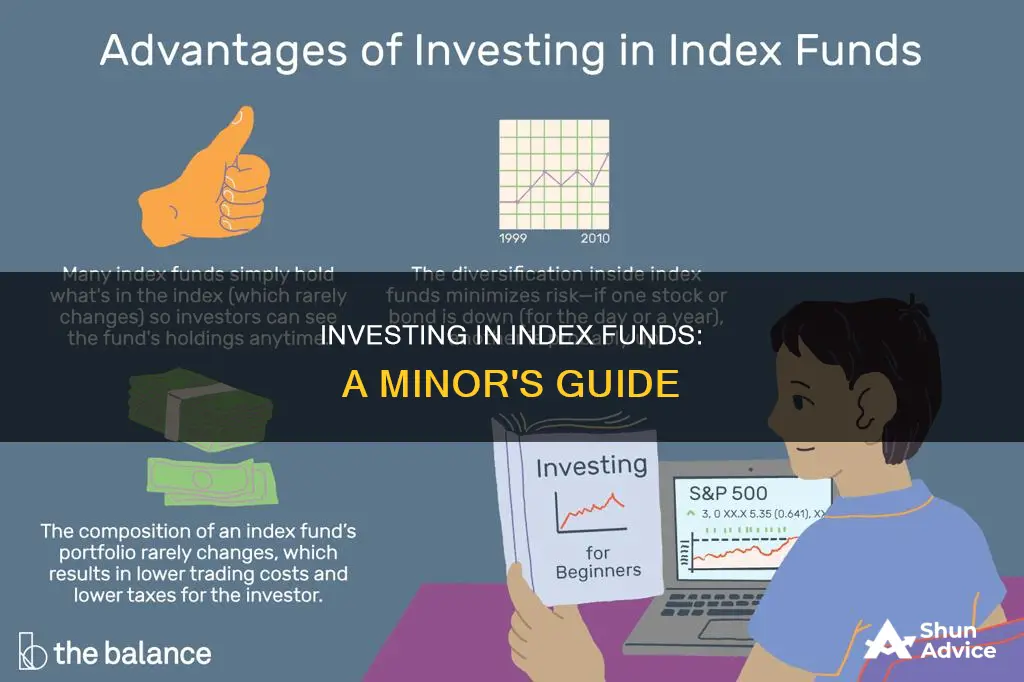
Index funds are a great way to build wealth over time and are popular with retirement investors. They are a group of stocks that mirror the performance of an existing stock market index, such as the S&P 500. While minors cannot directly invest in index funds, their parents or legal guardians can help them do so through a custodial account. This account is overseen by a guardian until the child reaches the age of majority, typically 18 or 21. The minor must be the sole account holder, and any income or capital gains from these investments are considered the child's income once they come of age. This guide will help parents and guardians understand the process of investing in index funds on behalf of a minor.
| Characteristics | Values |
|---|---|
| Who can invest in an index fund? | Anyone over the age of 18 can invest in an index fund. Minors can invest with the help of a parent/legal guardian. |
| What is an index fund? | A group of stocks that aims to mirror the performance of an existing stock market index, such as the Standard & Poor's 500 index. |
| How do index funds work? | Index funds don't try to beat the market but instead try to be the market by buying stocks of every firm listed on a market index to match its performance. |
| Why invest in index funds? | Index funds are a low-cost, easy way to build wealth over the long term. They are also less risky than individual stocks. |
| How much do index funds cost? | Index funds have fewer fees than actively managed funds. Important costs include the investment minimum, account minimum, expense ratio, and tax-cost ratio. |
| How to invest in index funds? | 1. Have a goal for your index funds. 2. Research index funds. 3. Pick your index funds. 4. Decide where to buy your index funds. 5. Open an investment account. 6. Keep an eye on your index funds. |
What You'll Learn
- Minors can invest in index funds through custodial accounts, overseen by a guardian until the child reaches the age of majority
- Minors can invest in the entire market, as well as in crypto and other asset classes, through a custodial account
- Minors can begin investing in index funds by learning the basics, finding their investing identity, and discovering the right investments for them
- Minors can open a brokerage account at 18, or earlier with parental help
- Minors can make their first investment once funds clear in their brokerage account

Minors can invest in index funds through custodial accounts, overseen by a guardian until the child reaches the age of majority
These accounts are considered irrevocable once they are set up. Account custodians can choose the mutual funds and alter investments, but any money or assets contributed cannot be taken back. While custodians are typically parents, anyone can be designated to manage the investments. Custodial accounts have no income restrictions, and anyone can make contributions to the account at any time.
After reaching the age of majority, the child may choose to use the account for any purpose. Many families use UGMA or UTMA accounts for college expenses, but since the assets are under the child's name, they may affect their eligibility for financial aid or limit the amount of aid the child receives.
Vanguard Mutual Funds: Best Retirement Investment Options
You may want to see also

Minors can invest in the entire market, as well as in crypto and other asset classes, through a custodial account
There are two types of custodial accounts: the Uniform Transfers to Minors Act (UTMA) and the Uniform Gift to Minors Act (UGMA). The main difference between the two is that UTMA accounts can hold a wider range of assets, including real estate, intellectual property, and works of art, whereas UGMA accounts are limited to financial assets such as cash, stocks, bonds, mutual funds, annuities, and insurance policies.
Custodial accounts offer several benefits, including tax advantages and flexibility in terms of contribution and withdrawal. However, one potential downside is that the assets in the account are considered the property of the minor, which may reduce their eligibility for financial aid when applying for college.
When choosing a custodial account, it is important to consider the investment options available, fees and costs, and the age at which the account will be transferred to the minor. It is also worth noting that the money in the account must be used for the benefit of the minor, although this term is relatively vague and can include a range of expenses beyond educational costs.
Mutual Funds vs. ETFs: Which is the Better Investment Option?
You may want to see also

Minors can begin investing in index funds by learning the basics, finding their investing identity, and discovering the right investments for them
Minors can begin investing in index funds by following these steps:
Learning the Basics
First, minors should learn the basics of investing. This includes understanding how the stock market works, the different types of investments available, and the risks and benefits of each. Reading books, articles, and other educational resources can provide a strong foundation of knowledge.
Finding Their Investing Identity
Next, minors should discover their investing identity. This means figuring out their risk tolerance, investment goals, and areas of interest. For example, are they interested in growth investing, income stocks, or value investing? Understanding their investing identity will help them make more informed decisions about their investments.
Discovering the Right Investments
After gaining a basic understanding of investing and their own investing profile, minors can start researching specific index funds to invest in. They can look at factors such as the fund's performance, fees, and investment strategy to find the right fit for their goals. It's important to remember that investing in index funds is a long-term strategy, and short-term market volatility should not deter them.
Opening a Custodial Account
Minors cannot directly open their own brokerage accounts, but they can invest through a custodial account set up by a parent or legal guardian. This account is typically overseen by the guardian until the minor reaches the age of majority, usually 18 or 21. The guardian can choose the mutual funds, alter investments, and manage the account on the minor's behalf.
Making the First Investment
Once the custodial account is set up and funded, minors can make their first investment in an index fund. They can decide which index fund to invest in based on their research and goals. It's important to remember that investing carries risks, and there is no guarantee of returns. However, with proper research and a long-term perspective, investing in index funds can be a great way to build wealth over time.
Activewear: Which Investment Funds are Taking an Interest?
You may want to see also

Minors can open a brokerage account at 18, or earlier with parental help
Minors can begin investing in index funds with the help of a parent or legal guardian. While the rules for custodial accounts can vary from state to state, they generally work in the same way. Accounts are usually set up through either the Uniform Gifts to Minors Act (UGMA) or the Uniform Transfer to Minors Act (UTMA). Most states offer UTMA accounts, which can save on taxes. The first $1,100 in earnings are not taxed in UTMA mutual fund accounts. The next $1,100 are taxed at the minor's tax rate, and annual earnings over $2,200 are taxed at the parent's tax rate. UGMA or UTMA accounts can include a variety of investment options to diversify the portfolio.
Once a minor reaches the age of 18, they can open a brokerage account and start investing independently. It is important to note that the tax implications will change once the minor becomes a legal adult, and they will be responsible for paying taxes on any income or capital gains from their investments.
To start investing in index funds, minors with the help of their parents or legal guardians can follow these steps:
- Learn the basics of investing: Read and educate yourself about investing, including stock market basics and how to invest in stocks. Understand the different types of investments, such as active and passive investing, and discover your risk tolerance and investing identity.
- Discover the right investments: Research and identify the index funds that align with your interests and financial goals. Consider factors such as company size, geography, business sector, and market opportunities.
- Open and fund a brokerage account: Work with your parent or legal guardian to open a custodial brokerage account. Compare different brokers and consider factors such as fund selection, convenience, trading costs, and impact investing options.
- Make your first investment: Decide on the index fund you want to invest in and submit your first stock purchase during market hours. Repeat the process to build a diversified portfolio, and continue adding funds to your brokerage account over time.
Venture Capital's XAI Investment: Who's Leading the Pack?
You may want to see also

Minors can make their first investment once funds clear in their brokerage account
Once a minor's brokerage account has been funded, they can make their first investment. Anyone over the age of 18 can open an online brokerage account, but those younger than 18 will need a parent or guardian's assistance. A parent can either open a brokerage account on behalf of their teen or set up a custodial account.
A custodial account is overseen by a guardian and the money and assets in the account cannot be withdrawn. The custodian holds the decision-making power of the account until the child reaches the age of majority, which is typically 18 or 21. In the US, most states offer Uniform Transfer to Minors Act (UTMA) accounts, which can save on taxes. The first $1,100 in earnings are not taxed in UTMA mutual fund accounts. The next $1,100 are taxed at the minor's rate, and annual earnings over $2,200 are taxed at the parent's rate.
Once the funds clear in the brokerage account, minors can make their first investment. They can decide which stocks they want to buy and set up the order. A market order is recommended to make the purchase. When ready, they can submit the order during market hours and become the owner of a small piece of a company or, if they choose to go the passive route, a basket of great companies.
Minors can continue adding money to their brokerage account and buying more shares of the companies or index funds they want to own to take advantage of compound interest over time.
Bond Funds: Risky Business, Not Worth Your Investment
You may want to see also
Frequently asked questions
A minor can invest in index funds with the assistance of a parent or legal guardian. An adult can open a custodial account on behalf of a minor, who will then direct the investments. Once the minor turns 18, the account and its contents become theirs, and they can make future investment decisions.
Investing in index funds as a minor can help to build wealth over time, taking advantage of compound interest. Index funds are also a low-cost and easy way to invest, as they are passively managed and require less work than actively managed funds.
One potential drawback is that the possession of these investments is transferred to the minor once they reach the age of maturity (usually 18). This means that a sizable sum of money could be passed to a child who may not yet have the maturity to handle it properly. Additionally, common ownership is not permitted in a minor's index fund portfolio, so the parent or guardian must act as the sole representative of the account.







